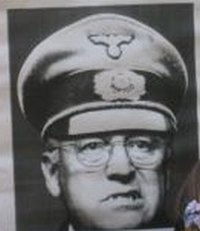
 It doesn't take a keen imagination to envision former Vice President of the United States, Dick Cheney, in the uniform of a Gestapo officer, replete with the skull insignia on the cap. Cheney would have been right at home in the more medieval branches of the Third Reich. Like those stalwart defenders of all things German, Cheney believed (and believes) that in order for the fatherland to remain safe, we had (and have) to do some pretty barbaric things. And like all the high ranking German officers of that period during the run up to WWII, Cheney knew that a frightened populace was an easily manipulated populace. Pose an internal or an external threat (or preferably, both) and you get mobs to cheer just about anything. Wrap barbarism or illegality in love of country, and the cheers grow even louder. Cheney and cohorts repeatedly mongered fear throughout his two terms in office, and that fear mongering worked so well that far too few Americans questioned the things being done in their names˜the "secret rendition," the "enhanced interrogation techniques," the darker nuances of the "Patriot Act," and the "regime change" in Iraq, all of which were made possible because of the classic Big Lie propaganda blitz that told a nervous nation that without such extreme measures, we would be sure to see mushroom clouds over American cities, and Islamic terrorists in every shopping mall.
It doesn't take a keen imagination to envision former Vice President of the United States, Dick Cheney, in the uniform of a Gestapo officer, replete with the skull insignia on the cap. Cheney would have been right at home in the more medieval branches of the Third Reich. Like those stalwart defenders of all things German, Cheney believed (and believes) that in order for the fatherland to remain safe, we had (and have) to do some pretty barbaric things. And like all the high ranking German officers of that period during the run up to WWII, Cheney knew that a frightened populace was an easily manipulated populace. Pose an internal or an external threat (or preferably, both) and you get mobs to cheer just about anything. Wrap barbarism or illegality in love of country, and the cheers grow even louder. Cheney and cohorts repeatedly mongered fear throughout his two terms in office, and that fear mongering worked so well that far too few Americans questioned the things being done in their names˜the "secret rendition," the "enhanced interrogation techniques," the darker nuances of the "Patriot Act," and the "regime change" in Iraq, all of which were made possible because of the classic Big Lie propaganda blitz that told a nervous nation that without such extreme measures, we would be sure to see mushroom clouds over American cities, and Islamic terrorists in every shopping mall.Like the Nazi high command, Cheney and crew knew the importance of euphemism to lend marketability to their repugnant practices. The word "torture" morphed into the aforementioned "enhanced interrogation techniques," and "secret rendition" transformed the practice of spiriting suspected terrorists to the dark dungeons of cooperative countries that were quite willing to provide cover for some pretty nasty violations of the Geneva Conventions in exchange for cash from the CIA. "Regime change" was the euphemism the American Reich used to put lipstick on a public relations pig--the unprovoked invasion of a sovereign nation that had nothing whatsoever to do with the event used to justify that invasion. Neither the Germans under Hitler nor the Americans under men like Cheney and Rumsfeld wanted their actions to be tagged with a word like "invasion." Countries that want to be thought of as good guys don't "invade" other countries, after all; the word is just too harsh, too negative, and too reminiscent of bloodthirsty Huns or Visigoths, charging across borders to rape, burn and pillage. So when the Germans stormed into places like the Sudentenland, Czechoslovakia, or Poland, they were merely seeking "liebenschraum," a quite benign quest to secure a little more "living space" for the Master Race, some places where Germans could just stretch out a bit. And when we stormed into Iraq, it surely wasn't something we wanted to bill as an "invasion." Nope, just a little exercise in unilateral "regime change" that didn't involve consulting with the Iraqi people on the matter. And when Congress facilitated the Bush Administration's assault on the Bill of Rights, they didn't package that bill as the "Spying on Americans Act of 2001," or the "Library Surveillance Program." Nope, it was the "Patriot Act," and who but a traitorous non-patriot could raise objection to such a good-sounding thing.
George Orwell warned about this kind of misuse of language in his famous essay, "Politics and the English Language," and in 1984, his novel about how totalitarianism manipulates both fear and language to assert powers that soon become total, hence the word for such regimes, whether of the left or the right. Communism as practiced in the Soviet Union suppressed free speech, and engaged in relentless spying on its own citizens, thus silencing dissent and stifling much-needed reform. People disappeared and they were held (or executed) without recourse to legal protections. And, on the right side of the totalitarian spectrum, the Nazis in Germany and the Fascists in Spain and Italy held power through the ruthless application of state terror, suppression of dissent, suspension of a free press and abrogation of the legal rights of their citizens.




No comments:
Post a Comment